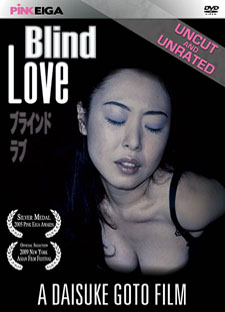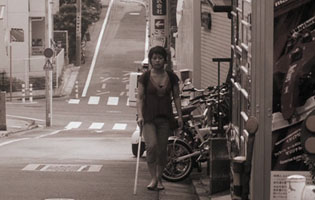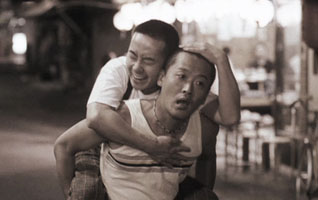Daisuke’s life is currently in the dumps. He’s recently divorced, is a struggling ventriloquist having trouble making ends meet, and has taken on an apprentice named Yoichi that isn’t exactly focused on learning the craft. While his professional life may not be about to take an upturn, his love life is as a blind fan named Hikari gets backstage after  one of his shows and professes her love for him, which has happened just by listening to his voice. Trouble is, she bumps into Yoichi instead, and now she thinks Daisuke is much taller than he actually is and seems to like that fact. Daisuke, who is insecure due to his height, decides to have Yoichi stand in for him on a date with Hikari while he does all the talking. Things go a little fast though, and Yoichi ends up sleeping with Hikari as Daisuke is force to watch, much to his dismay. Daisuke is now absolutely depressed, but can’t figure out how to tell Hikari the truth. Not helping matters is Yoichi, who sabotages him every step of the way.
one of his shows and professes her love for him, which has happened just by listening to his voice. Trouble is, she bumps into Yoichi instead, and now she thinks Daisuke is much taller than he actually is and seems to like that fact. Daisuke, who is insecure due to his height, decides to have Yoichi stand in for him on a date with Hikari while he does all the talking. Things go a little fast though, and Yoichi ends up sleeping with Hikari as Daisuke is force to watch, much to his dismay. Daisuke is now absolutely depressed, but can’t figure out how to tell Hikari the truth. Not helping matters is Yoichi, who sabotages him every step of the way.
As regular visitors and readers of the site will probably already know, I’m a big fan of director Daisuke Goto’s A Lonely Cow Weeps at Dawn, a Pink film that’s actually heartwarming, albeit in the most bizarre fashion possible. I think that may be a quirk I have, as standard romance fare makes me want to gouge my eyes out, but throw in some aspects that are kinky and twisted, and somehow it ends up touching my blackened heart. So even though it was a romance, having seen Mr. Goto’s previous work, I was quite excited to see Blind Love, and it didn’t disappoint in any way whatsoever. Once again he’s managed to craft a film that is at once absurd and unconventional yet is filled with undeniable humanity and sentimentality. It really says something about Goto’s ability that he’s able to do this on a consistent basis and not ever have it feel forced or artificial; the man is a master at creating eccentric love stories.
And because of the film’s eccentricity, the comedy really shines through and, like the romantic elements, doesn’t feel manipulative. They play hand-in-hand with one another, almost a “finding love through laughter” type of formula. Some of the scenes, such as watching Daisuke sit on Yoichi’s lap while talking to Hikari so it doesn’t sound as if his voice is coming from a different area is really funny, as is watching Daisuke later on in the film attempt to walk around in giant platform shoes as he’s sick of Yoichi having interactions with Hikari yet is still not brave enough to tell her the truth. There’s also some sadness and melancholy that permeates throughout Blind Love, and while the film may only clock in at 65 minutes, the characters are so well developed that you’ll actually feel something yourself. That’s quite a feat from a supposed “sex flick”.
In one of the included extras, Goto says that the film took 7 days to make, each day clocking in at around 15 hours. While to American audiences that may not sound like much, when taking into consideration most Pink films are shot in 5 days or less, this is a pretty big production and it definitely shows. Cinematographer Masahide Iioka employs some  wonderful panning shots and framing that elevates the look of the film to something very professional and classy. All of the acting is top-notch and the score, which at first seems a little out of place, eventually settles in nicely and you’ll see it was actually perfect from the first frame.
wonderful panning shots and framing that elevates the look of the film to something very professional and classy. All of the acting is top-notch and the score, which at first seems a little out of place, eventually settles in nicely and you’ll see it was actually perfect from the first frame.
The only complaint I can really levy at the film is I would have liked to have seen the character of Daisuke’s ex-wife fleshed out a bit more. At its core, Blind Love is about two people insecure with one of their attributes, Daisuke with his height and Hikari with her blindness, finding one another. But looking at Daisuke’s ex-wife, who isn’t bad looking in the least, I wonder how he ended up with her at all; he was always short and always a struggling ventriloquist with little money, so it would have been great to know what attracted her to him in the first place and why things went bad.
Blind Love is the perfect film to test the waters of the Pink genre with if you’ve been interested in seeing what all the fuss is about. It’s not misogynistic, it’s not overtly sexist or over-the-top, and is honestly just a solid, offbeat love story with some nudity and sex thrown in to appease the producers and the genre it’s a part of. It’s one of a handful of Pink films that, if edited of its sex scenes, would have the same appeal and effect, which really says something about the proficiency and talent of Daisuke Goto. In one of the extra features on the release, Goto says the film actually played a “Women Only” film festival in Korea and the female attendees loved it, driving some to tears. If that’s not a ringing endorsement that many of these films are much more than just sex and have a wide-range of allure, I don’t know what is.

PINK EIGA has come a long way since their first releases 11 months ago, and Blind Love is the proof, as it’s unquestionably their best release to date. The film is presented in 1.85:1 letterboxed widescreen, and this is the best print PE has had access to thus far. Co-founder Ayumu Oda personally told me that most Pink films have five or less prints made, and by the time they finish their theatre rounds, many of them are in horrible shape, with only a D2 backup remaining. Not sure what they were able to use for this release, but it looks really good, with little print damage, great color reproduction, and nice definition, which has been lacking on some of their previous releases. It would have been nice if this could have been flagged for progressive scan, but I’m more than happy with the quality here. Audio is available in Dolby Digital 2.0 and sounds clean and clear, doing justice to all dialogue and the score. Burned in subs are free of errors, which is definitely how they should be if they aren’t removable.
Proving that Tsumugi wasn’t just a fluke in the extras department, Blind Love is loaded with special features. First up is audio commentary with director Daisuke Goto and cinematographer Masahide Iioka, which is available in both Japanese and English. Sadly, you’ll have to listen to this via English translation since there are no subs for the Japanese track, probably due to the fact that the film itself is hard-subbed, which would make additional subtitles on-screen quite confusing. I think if PE intends to do commentary in the future, they might want to take into consideration making those films soft-subbed, as I’d much rather hear the directors talk in their own voices. A 19 minute interview with director Goto is up next, shot on a rooftop in Soho while he was in NYC for an Asian Film Fest. He talks about his history in cinema, working under such greats as Masaru Konuma, and how pleased he’s been with the reception Blind Love has been receiving around the world. More footage is on hand from the same festival, including an intro to the film where Goto’s first words are “Fuck You!” to the audience (accompanied by much laughter) and a 13 minute Q&A session with a lot of good questions coming from the crowd. Cinematographer Iioka talks about his history in film during a 10-minute featurette, and rounding out the extras are a still images gallery, cast and crew bios and filmographies, and trailers for this and other current and future PINK EIGA releases.
Please feel free to discuss "Blind Love" here, in our forums!

